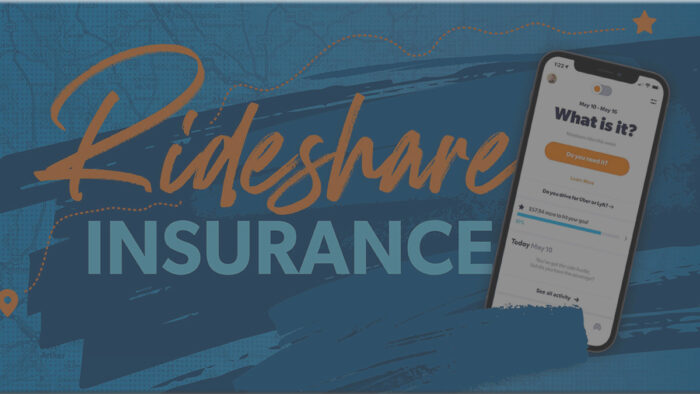If you’re a driver who partners with transportation network companies (TNCs) or rideshare services like Uber or Lyft, then rideshare insurance is a crucial type of protection for you. This coverage is designed to fill in the gaps between your personal auto insurance and the coverage offered by the rideshare company, providing you with comprehensive protection throughout the entire time you’re working.

Rideshare insurance is a hybrid policy that combines elements of personal auto insurance and commercial coverage. It’s designed to protect you from the unique risks that come with driving for a rideshare company, such as the increased likelihood of accidents during peak hours or the risk of property damage while transporting passengers.
By having this type of insurance, you can rest assured that you’re fully covered no matter what happens while you’re on the road.
How Does It Work?
When you use your personal vehicle for ridesharing, you might find that your personal auto insurance policy does not cover you while you’re working. This is because these policies typically exclude coverage for vehicles that are being used for commercial purposes, such as transporting passengers for hire.
Rideshare companies, on the other hand, may provide some coverage during certain stages of the ridesharing process. However, this coverage can be limited or conditional, and there may be gaps in coverage that leave you vulnerable to financial losses in the event of an accident.
Rideshare insurance is designed to address these gaps by providing coverage that bridges the gap between your personal auto insurance and the coverage provided by the rideshare company.
This type of insurance is especially important during the periods when you are waiting for a ride request or driving to pick up a passenger, as these are times when you may not be fully covered by either your personal insurance or the rideshare company’s policy.
During the stages when you are en route to pick up a passenger and throughout the trip with a passenger in the car, the rideshare company’s commercial policy will typically provide coverage. However, the specifics of this coverage can vary depending on the rideshare company and the state in which you are operating.
It’s important to understand the coverage that is provided during each stage of the ridesharing process so that you can make informed decisions about your insurance coverage and protect yourself from financial risk.
What Does It Cover?
Rideshare insurance is a crucial type of coverage for drivers who work with transportation network companies, such as Uber or Lyft. It can provide important protections that bridge the gap between personal auto insurance and the coverage provided by the rideshare company. Here are some of the specific types of coverage that may be included in rideshare coverage:
- Collision coverage: This covers damages to your vehicle from an accident, irrespective of who is at fault.
- Comprehensive coverage: This covers non-collision damages to your vehicle, such as theft, vandalism, or weather-related damage.
- Uninsured/underinsured motorist coverage: This provides coverage if you’re involved in an accident with a driver who has insufficient or no insurance.
- Medical payments or personal injury protection: Both insurance policies pay for the medical expenses of you and your passengers, irrespective of who’s at fault.
It’s important to note that the specifics of rideshare coverage can vary depending on the insurance company and the type of coverage you carry. Additionally, coverage types may depend on whether they are included on your personal auto policy and can vary by state.
By carefully reviewing your policy and discussing your coverage options with your insurance provider, you can ensure that you have the protection you need while driving for a rideshare company.
Is Rideshare Coverage Necessary?
Rideshare coverage is tailored for individuals who utilize their personal vehicles for ridesharing purposes. This specialized insurance can offer vital protection in situations where a standard personal auto policy lacks coverage and the insurance offered by the rideshare company may not fully meet your needs.
How to Obtain Rideshare Coverage
Begin by reaching out to your current auto insurance provider to inquire about rideshare insurance options. Ask about adding an endorsement to your existing policy that covers you while logged on to the rideshare app but without a passenger. Discuss the various options available with your agent or provider. If your current insurer does not offer rideshare coverage, explore other insurance providers that do.
FAQs
How much does rideshare coverage cost?
The cost of rideshare coverage can vary depending on the provider, the level of coverage, and your personal driving history. On average, rideshare coverage can cost between $10 and $30 per month. But it’s best to get a personalized quote from your insurance provider to get an accurate estimate.
Can I use my personal auto insurance policy instead of rideshare insurance?
Personal auto insurance policies typically do not cover accidents that occur while you are driving for a rideshare company. This means that if you are involved in an accident while driving for Uber or Lyft, your personal auto insurance policy may not cover the damages.
Do I need rideshare insurance if I already have personal auto insurance?
Personal auto insurance policies typically do not cover accidents that occur while you are driving for a rideshare company. This means that if you are involved in an accident while driving for Uber or Lyft, your personal auto insurance policy may not cover the damages.
Rideshare coverage is specifically designed to provide protection during these times, so it’s important to consider it if you are a rideshare driver.
Can I get rideshare insurance if I don’t have personal auto insurance?
It is generally not recommended to drive for a rideshare company without personal auto insurance, as this can leave you unprotected in the event of an accident. However, if you do not have personal auto insurance, you may still be able to purchase rideshare insurance through certain providers.
It’s important to check with individual insurance companies to see if they offer rideshare insurance for drivers without personal auto insurance.


